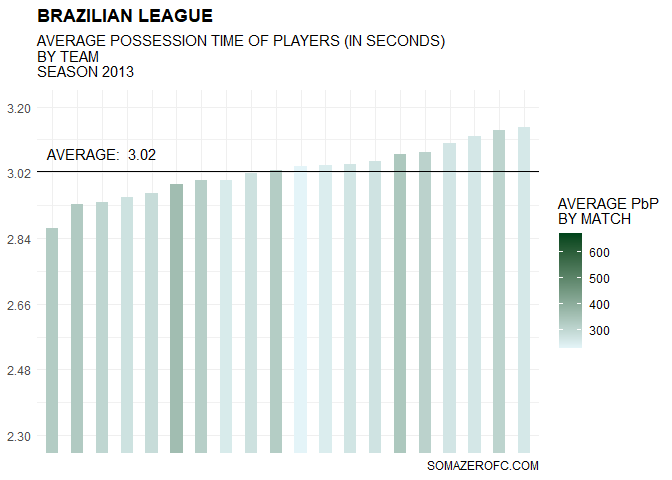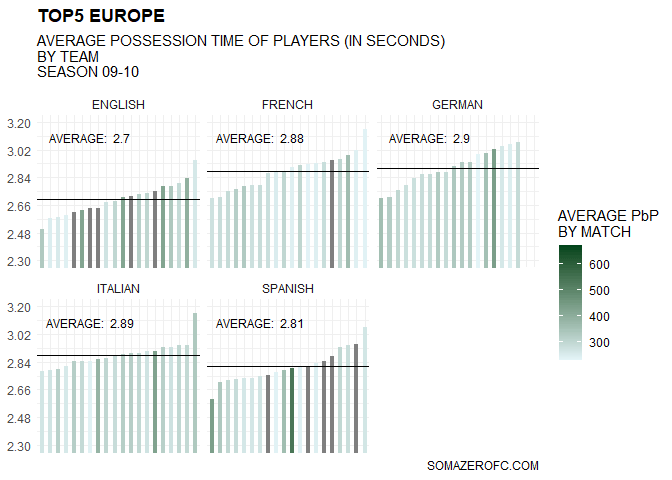A few days ago I watched the amazing interview conceded by Rafinha, recently added to Flamengo squad from Bayern, on the "Aqui com Benja" (a brazilian TV Show), and many things that he said were very interesting, but one in particular caught my attention. According to Rafinha, the speed of the game in Brazil is completely different than the one in Europe. In his words: "... this one is slow, he won't fit in Europe. How many times have I heard - 'Wow! What a good lad! But for Europe... no... he won't make it...' But why not?! Because in Europe, the game is much faster, he will need an year, year and a half to adapt; few are the players who come to Europe and take just a bit of time to adapt to the speed... The speed we face here, that we train here, is much bigger... I have been in Bayern for 8 years, and all the managers who passed here - Jupp Heynckes, Guardiola, Ancelotti and now Kovac - mate, apart from the wingers, everyone is trained to touch one, two times the ball - you can see it in Bayern's matches, the third touch is only for emergency." He talks about many other interesting things, and you can check the full interview here (unfortunately, it is only in Portuguese, but int case you want to check yourself, the part of the interview I mentioned is at 26:54).
Rafinha's interview reinforces what Douglas Costa had already said in another interview, link here (also in Portuguese).
Interviewer: How do you see Grêmio out there?
Douglas Costa: "Not only Grêmio, but brazilian football in general. It is slower. When I compare it to a Bundesliga or Champions League match, brazilian football seems like another sport. The agressivity we have in Europe is totally different from the one we have here. Bayern and Barcelona suffocate their opponents. Sunday, Grêmio played from behind, and Ponte Preta would give them spaces. The central midfielder had space to spin, look, think and no one would come close to him. In Europe, the opponent would have already stolen the ball. And it doesn't have to be Bayern. Köln would do that."
The two players have experience in Brazil and Europe, and both of them stated the same thing: football in Europe is much faster than in Brazil. In other words, they were also saying that the time each player keeps the ball is shorter. But how faster? In this post, I will explore a bit this subject, comparing data of the brazilian league and the main european leagues - spanish, french, german, english and italian.
To extract the information from data, before we need some definition. The possession by player (PbP) happens everytime a player receives the ball from a pass made by a teammate, until the moment he passes (accurate or inaccurate) or shoots. Therefore, we exclude possesions that started with an inaccurate pass of the opponent or any sort of rebound. Thus, the possession time of a player is given by the accurate pass of a teammate to him, until he passes (accurately or inaccurately) or shoots.

The first thing we are going to see is the average possesion of players in the brazilian league and how it has behave in time. The graphic below brings us two information: how the average possession of players has behaved in time, and how many possessions, on average, each team have, by season.

In 2013, the average possession time by player was 3.02 seconds. If we filter only matches from 2013 and 2016, we can clearly see a trend of a smaller time - in 2016, this number is 2.92. But, in the following years, there are a slight increase - in the current season, it is 2.96. We can say that it has decreased, but now stabilized around 2.95. But one thing that is clear is, with time, the average number of possesion by players increases (visually represent by the colour of the bars - with time, they get darker).

Now, to know if the average possession time by player, in Brasileirão, is high or low, we need a reference, that in this case will be the main european leagues.

Bundesliga has only 18 teams, that is why it has two less teams than the other leagues in the chart.
Aparenlty, the german, french and italian leagues have declined their averages with time, while the spanish and english leagues are stable. Premier League average, in the season 09-10, was 2.7. That means, 10 years ago, the English League was already 10% faster than the Brazilian League in the current season.

It is important to say that the average possession time by player does not filter region of the field, nor type of play (counter attack, positional attack, etc), therefore, there are many subproducts of this data. In this first analysis, the intention was the demonstrated, with data, that in fact in the Brazilian League, on average, players keep the ball longer. I will post more about these data, bringing more specified contexts that help us understand a bit more the patterns of the teams across leagues and seasons.